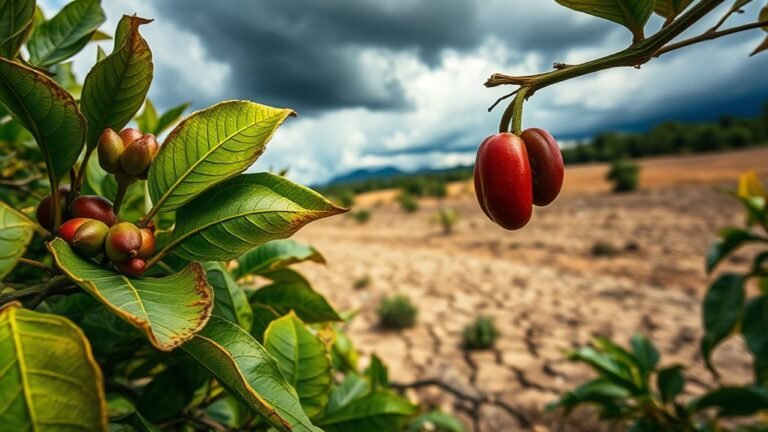The Role of Baristas in the Coffee Industry
You play an essential role in the coffee industry by mastering espresso techniques that guarantee quality and consistency. Baristas optimize variables like grind size, temperature, and pressure to extract the best flavors while maintaining equipment. You also educate customers, shaping their coffee preferences and driving trends such as cold brew’s rapid growth. Your personalized service builds customer loyalty and strengthens local communities. Understanding these impacts reveals how baristas influence more than just the cup you enjoy.
The Expertise Behind the Espresso Machine

While the espresso machine might seem straightforward, mastering its operation requires a deep understanding of variables like pressure, temperature, and grind size. You need to recognize that even slight deviations in these factors can affect extraction quality and flavor profile. Espresso artistry isn’t just about pouring shots; it involves precise control and consistent adjustments based on data. You must also prioritize machine maintenance to guarantee stable performance—regular cleaning and calibration directly impact shot consistency and equipment longevity. By analyzing pressure curves and temperature stability, you gain insight into optimizing each espresso shot. Embracing these technical elements grants you the freedom to craft beverages with accuracy and reliability, elevating your role beyond manual labor to skilled craftsmanship within the coffee industry.
Baristas as Coffee Educators
You rely on baristas not just for your espresso but also for their knowledge of brewing techniques, which can greatly influence flavor extraction. They often share data-backed insights about coffee origins, helping you understand how factors like altitude and soil impact taste profiles. This educational role enhances your appreciation and guides more informed choices.
Brewing Techniques Explained
Because brewing methods directly influence the flavor profile and quality of coffee, baristas play an essential role as educators in this process. When you explore techniques like cold brew and pour over, you’ll notice distinct extraction patterns impacting acidity, body, and aroma. Cold brew’s extended steeping time yields lower acidity and a smoother taste, while pour over emphasizes clarity and brightness due to controlled pour rate and water temperature. Baristas often guide you through these variables, helping optimize grind size, water-to-coffee ratio, and brew time to suit personal preference. By understanding the science behind each method, you gain freedom to tailor your coffee experience precisely. This data-driven approach empowers you to appreciate how brewing influences every cup’s complexity and balance.
Coffee Origin Insights
Although the nuances of coffee origin might seem subtle, they greatly shape the flavor profile and overall experience of your cup. As a barista, understanding the distinct characteristics of various coffee regions allows you to educate customers effectively. Data shows that coffees from East Africa often have bright, fruity notes, while South American beans tend toward nutty and chocolatey flavors. By communicating these specific flavor profiles, you empower you to make informed choices aligned with your preferences. Baristas act as guides, translating geographical and environmental factors into tangible tasting experiences. This educational role supports your freedom to explore diverse coffees and refine your palate. Ultimately, knowing coffee origins enhances your appreciation and elevates your daily ritual beyond mere consumption.
Influencing Coffee Trends and Innovations
You play a key role in shaping coffee trends by adopting innovative brewing techniques that data show can enhance flavor profiles. Experimentation with diverse ingredients and methods often leads to measurable shifts in consumer preferences. Additionally, your early adoption of sustainable practices aligns with growing market demand for environmentally responsible products.
Trendsetting Brewing Techniques
When baristas experiment with brewing techniques, they often drive significant shifts in coffee trends and innovations. By refining methods such as cold brew extraction, you can enhance flavor clarity and reduce acidity, appealing to a wider audience seeking smoother coffee experiences. The introduction of nitro coffee, where cold brew is infused with nitrogen gas, has further expanded consumer preferences by offering a creamy texture and visually engaging presentation. Data shows that cold brew sales increased by over 200% in recent years, indicating your impact on market dynamics. These trendsetting brewing methods not only diversify product offerings but also influence equipment development and café culture. Embracing such innovations allows you the freedom to shape industry standards while meeting evolving consumer demands efficiently and effectively.
Experimentation With Flavors
Building on innovative brewing methods, flavor experimentation plays a pivotal role in shaping coffee trends and consumer preferences. As a barista, you engage with diverse flavor profiles, systematically testing combinations to identify successful taste pairings. Data from sensory evaluations show that consumers increasingly favor nuanced, complex flavors over traditional profiles, informing your experimentation. By manipulating variables such as roast level and ingredient blends, you influence the final cup’s sensory attributes. This process not only meets evolving market demands but also drives innovation within the industry. Your ability to analyze feedback and adapt flavor formulations empowers you to contribute meaningfully to coffee’s dynamic landscape. Ultimately, your experimental approach fosters freedom in taste exploration, expanding consumer choice and advancing the sector’s creative boundaries.
Adoption of Sustainable Practices
Although sustainable practices require upfront investment and operational changes, their adoption is increasingly shaping coffee trends and innovations. You’ll notice that sustainable sourcing now accounts for over 40% of specialty coffee procurement, reflecting a shift toward ethical supply chains. This shift isn’t just ethical—data shows it reduces environmental impact by up to 30%, appealing to consumers who value freedom in their choices. Additionally, eco friendly packaging has grown by 25% in market share, driven by demand for minimal waste. By embracing these practices, baristas influence not only flavor profiles but also consumer expectations, pushing the industry toward transparency and responsibility. For you, this means supporting coffee that respects both the planet and your desire for authentic, liberating experiences.
Crafting Unique Customer Experiences
Since customer experience greatly influences brand loyalty, baristas play an essential role in shaping how patrons perceive coffee shops. Data shows that effective customer engagement increases repeat visits by up to 30%. When you interact with baristas who personalize service and create memorable sensory experiences—aromas, textures, and flavors—they enhance your emotional connection to the brand. This multisensory approach is linked to a 20% increase in customer satisfaction scores. As someone who values freedom in choice and expression, you benefit from baristas who adapt their methods to your preferences, fostering autonomy and a sense of belonging. By focusing on tailored interactions and rich sensory stimuli, baristas transform routine coffee purchases into unique experiences, directly impacting customer retention and overall industry growth.
The Impact of Baristas on Coffee Quality

When baristas apply precise brewing techniques and maintain strict quality controls, the resulting coffee consistently meets higher standards. Your experience with coffee quality is directly shaped by barista influence, which affects extraction, flavor balance, and consistency. Research shows skillful baristas can improve cup quality by:
Skilled baristas enhance coffee quality through precise techniques, ensuring balanced flavor and consistent, superior cups every time.
- Optimizing grind size and dose to control extraction.
- Regulating water temperature and pressure for flavor precision.
- Ensuring equipment cleanliness to avoid contamination.
- Adjusting brew parameters based on bean origin and roast profile.
This data-driven approach reduces variability, allowing you to enjoy a reliably superior cup. By understanding barista impact, you gain freedom to select coffee experiences aligned with your preferences, supported by measurable quality improvements. The barista’s role is vital in bridging raw ingredients and your final cup, making their influence essential for elevating coffee quality.
Building Community Through Coffee Culture
As coffee consumption grows globally, its role in fostering community connections becomes increasingly measurable. When you frequent coffee shops, you participate in an ecosystem where baristas actively cultivate social bonds. Data shows that establishments hosting community events see a 25% increase in repeat customers, highlighting how these gatherings reinforce local ties. Baristas often facilitate local partnerships, collaborating with nearby businesses and artists, which boosts economic synergy and enriches cultural exchange. This network not only supports small enterprises but also provides you with a sense of belonging and freedom to engage authentically. By attending these community events, you contribute to a dynamic coffee culture that transcends mere consumption, turning coffee shops into hubs of connection and collective identity.
Career Growth and Opportunities for Baristas
Although barista roles are often seen as entry-level, data indicates significant potential for career growth within the coffee industry. You can leverage career advancement by focusing on skill development and exploring diverse opportunities. Consider these paths:
- Specialization: Master espresso techniques or latte art to increase your marketability.
- Management: Shift to supervisory or store manager roles, overseeing operations and teams.
- Education: Become a trainer or coffee educator, sharing knowledge and refining your expertise.
- Entrepreneurship: Use your skills to open your own café or coffee-related business.
Frequently Asked Questions
What Are the Typical Work Hours for a Barista?
When figuring out typical work hours, you’ll find barista shift patterns often vary between 4 to 8 hours, depending on the café’s size and location. Weekend availability is usually essential, as demand peaks then. You might work early mornings or late evenings, offering some flexibility. Data shows many baristas prefer part-time schedules, balancing work freedom with steady income. Understanding these patterns helps you choose shifts that fit your lifestyle best.
How Much Do Baristas Usually Earn?
You can expect the average salary for baristas to range between $25,000 and $30,000 annually, depending on location and experience. Tips earnings often add a meaningful boost, sometimes increasing total income by 10-20%. If you value flexibility and freedom, combining base pay with consistent tips can make the role financially viable. Keep in mind, earnings vary widely, so understanding local demand and clientele is essential for maximizing income.
What Equipment Do Baristas Use Daily?
Picture the espresso machine as your daily compass, guiding every cup’s flavor. Baristas rely on this core equipment alongside milk frothers, which transform milk into velvety textures, enhancing taste and presentation. These tools, backed by precise temperature and pressure controls, guarantee consistency and quality. Using such data-driven equipment lets you master coffee-making with freedom, balancing art and science to craft each beverage exactly as intended.
Are Barista Skills Transferable to Other Jobs?
Yes, your barista skills are transferable to many jobs. Strong customer service abilities mean you can handle client interactions effectively, which is valuable in retail, hospitality, and sales. Your experience with team collaboration boosts your capacity to work well in group settings, a trait employers across industries seek. Data shows employees with these skills often adapt faster and perform better, giving you more freedom to explore diverse career paths beyond coffee.
How Do Baristas Handle Difficult Customers?
You’d think handling difficult customers is like defusing a ticking time bomb, but it’s actually a skill grounded in solid conflict resolution techniques. Baristas use active listening to address customer complaints objectively, ensuring they understand the issue fully before responding. Data shows that calmly acknowledging concerns reduces tension by up to 70%. When you master this, you create a space where both parties feel heard, freeing everyone from unnecessary conflict and enhancing overall satisfaction.






